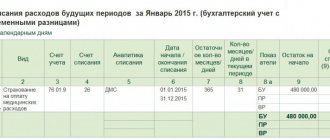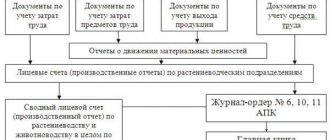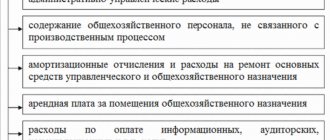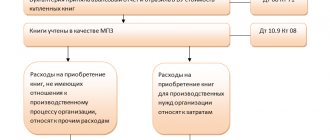Who has the right to receive money
Accountable amounts are money that is given to employees to carry out company instructions.
New reporting rules have been established relatively recently - from August 19, 2021, with the adoption of a new edition of Bank of Russia Directive No. 3210-U. Employer, according to Part 1 of Art. 19 Federal Law dated December 6, 2011 No. 402-FZ “On Accounting”, is obliged to organize and maintain internal control of the facts of economic activity. The procedure for monitoring the issuance of money to accountable persons is determined by the head of the company. He issues an order with a list of persons entitled to receive funds from the organization’s cash desk.
Accountable persons are persons to whom an organization or individual entrepreneur gives money to carry out instructions and who are obliged to provide a report on their use. They are any employees of the enterprise.
On what basis are money issued?
If necessary, some employees may be given funds for entertainment or business expenses of the enterprise. They have the right to receive money based on the order of the manager regarding the accountable persons, if their full name. and position are indicated in the list of people who have this opportunity.
If a suspicious transaction was completed within one year before the acceptance of the application for bankruptcy or after the acceptance of this application, then the circumstances specified in paragraph 1 of Art. 61.2 of Law No. 127-FZ.
Establishing the fact that a transaction was completed free of charge (lack of actual payment) in the presence of signs of insolvency or insufficiency of property of the debtor at the time of its completion gives grounds to assume that there is a purpose of causing harm to the property rights of creditors and, thus, affects the conclusion that the transaction is invalidated by virtue of paragraph 2 Art. 61.2 of Law No. 127-FZ.
How to receive the money
Before the introduction of the amendments, in order to receive money, the employee sent an application to the accounting department or human resources department, which indicated the required amount and an explanation of what it would be spent on.
But in 2021, from August 19, it has become easier to issue reports to employees. The changes are provided for by the instruction of the Central Bank of the Russian Federation dated June 19, 2017 No. 4416-U. From August 19, 2007, it is not necessary to submit an application. To issue money, an order or other administrative document of the company on behalf of the director is sufficient. The form of such a document is arbitrary. But it must contain the following details:
- FULL NAME. faces;
- document registration number;
- amount of cash;
- the period for which cash is issued; appointment (optional);
- director's signature and date.
It is allowed to carry out settlements with accountable persons using a new sample of statements:
Changes from 11/30/2020
The new instruction of the Bank of Russia No. 5587-U dated 10/05/2020 came into force on 11/30/2020. The financial regulator has established a new procedure for issuing and spending accountable amounts in 2021 and approved new requirements for cash transactions in organizations and individual entrepreneurs. Now cash transactions are allowed to be carried out using devices that operate automatically without the participation of employees. Cashiers have the right not to require an identification document from recipients of money, although they are required to make sure that the person indicated in the debit order is in front of them.
Cashiers were prohibited from issuing banknotes with damage: contamination of the surface of the front or back sides, leading to a decrease in the brightness of the image by 8% or more, with extraneous inscriptions or drawings consisting of two or more characters or symbols, with stamp impressions or stains with a diameter of 5 mm and more. If the banknote contains one or more of these damages, as well as others specified in clause 2.9 of Bank of Russia Regulation No. 630-P dated January 29, 2018, it is subject to mandatory delivery to the bank. It is prohibited to accept cash from other persons who have been declared insolvent; this is stipulated by the new rules for working with accountants.
In the application of the accountable person for the issuance of money, it is no longer necessary to record the amount and the period for which the cash is issued. It is not necessary for the manager to sign the application. Organizations have the right to issue one order for several procedures for issuing cash to one or more accountable persons. The document must indicate:
- surnames and initials of cash recipients;
- amounts of cash;
- the period for which funds were issued for the report.
The requirement for a mandatory advance report within three days has been abolished. Now organizations and individual entrepreneurs independently set the period after which the accountable person must report and return the remaining money to the cash desk. This period is approved by the head of the organization or individual entrepreneur by a separate order and indicates it in the regulations on the issuance of money on account.
Use free instructions from ConsultantPlus experts to correctly issue money and account for it.
to read.
What amount should I report?
In Russia, payments in rubles that are carried out within the framework of one agreement should not exceed 100,000 rubles.
This is indicated in paragraphs 5 and 6 of the instructions of the Central Bank of the Russian Federation dated October 7, 2013 No. 3073-U. It is believed that this limit cannot be exceeded. But there are also nuances. This limit on expenses is established only for settlements with other organizations and individual entrepreneurs (see clause 6 of the instructions of the Central Bank of the Russian Federation No. 3073-U). But it does not apply to settlements with individuals who are employees of the enterprise. This includes wages, social benefits, personal needs of the head of the organization and the issuance of funds. Taking this into account, issuing a larger amount is not a violation of cash discipline.
Issuance to the accountable and return of money to them: whether to use cash register
Let us recall that CCT is generally used by all organizations and individual entrepreneurs when making calculations. Is it necessary to use a cash register when issuing money to an accountable person or when returning accountable funds to them?
Let us remind you that settlements are the acceptance (receipt) and payment of funds in cash or by bank transfer for goods, work, services, incl. in the form of advance payment or advances (Article 1.1 of the Federal Law of May 22, 2003 No. 54-FZ). It would seem that when money is issued on account or when accountants return an unspent advance, calculations are made. Is it necessary to use CCT in this case?
According to the Moscow Office of the Federal Tax Service, the issuance of cash from the cash register on account is essentially not a settlement in the sense included in the concept of “settlements” by Federal Law No. 54-FZ of May 22, 2003. Therefore, there is no need to use CCT in this case (Letter of the Federal Tax Service for Moscow dated June 14, 2018 No. 17-26/2/ [email protected] ). The position expressed by regional tax officials was confirmed by the federal tax department in a later letter (Letter of the Federal Tax Service dated June 29, 2018 No. 17-15 / [email protected] ).
Extending the logic to the return of money by an accountable person, the employer should also not use CCT when accepting unspent funds from an accountable person.
Is a report required for the amount received?
As stated in clause 6.3 of the instructions of the Central Bank of the Russian Federation dated 03/11/2014 No. 3210-U, until 08/19/2017 it was prohibited to issue money if the employee did not provide a report on previously received amounts.
Here the Central Bank made changes to the report. Now money can be issued even if the employee has not repaid the debt on previously issued funds. But this does not mean that employees no longer need to prepare advance reports on the amounts spent. The employee must submit reporting documents on the money spent to the accounting department.
If the employee spent personal money
If an employee has raised his own funds to meet the needs of the organization, he draws up a reporting statement. The employee writes an application for reimbursement of the money spent by him, the manager accepts, reviews and approves it. An order is then issued to reimburse the money spent.
IMPORTANT!
If the employee spent his own money, this is not reporting!
The reimbursement algorithm must be described in the organization’s regulatory framework by drawing up a local act with an appendix in the form of a sample report on the employees’ own money spent on the needs of the institution. How to formalize the issuance of reports according to the new rules in this situation is established in the accounting policy and in the regulations on the issuance of money for reports to employees.
The accounting department must carefully check the submitted primary documents for reimbursement. If possible, the employee must register them directly with the organization in order to avoid additional personal income tax accrual to him. Letter of the Ministry of Finance No. 03-04-06/3-65 dated 04/08/2010 explains such situations as follows: there is no economic benefit in the employee’s actions, and accordingly, there is no taxable base.
Report deadlines
As stated in clause 6.3 of the instructions of the Central Bank of the Russian Federation dated March 11, 2014 No. 3210-U, the employee is obliged to provide a report on the amounts received no later than three working days after the expiration of the period for which these amounts were issued.
But the new requirements for the preparation of accountable amounts do not establish a specific period during which an employee must submit a report on the money spent. It is indicated in the employer's order. If the return period is not established, the employee submits the report on the same day on which he received them. This is indicated in the letter of the Federal Tax Service dated January 24, 2005 No. 04-1-02/704.
But for travel expenses there are special conditions for the advance report. According to clause 26 of the regulations, approved by Decree of the Government of the Russian Federation of October 13, 2008 No. 749, the employee is obliged to report on them within 3 working days from the date of return.
Advance report: what can be taken into account
The issuance of funds by an organization to a person in an employment relationship with it is standard business practice. The money that the company, with the participation of the accounting department, transfers for reporting is accompanied by documentation confirming its intended use. Documents are carefully reviewed by regulatory authorities. The main question that worries employees responsible for the expense report: both accountants and accountable persons - what can be taken into account? Despite the abundance of explanatory letters, guidelines, guidelines and instructions, many issues remain controversial. An employee whose “hands” are entrusted with accountable funds is constantly forced to think about how to collect documents confirming his expenses, and the accounting department has to check the submitted papers and checks line by line. In general, the following rules apply to advance money:
- Funds are issued for business and operational needs and travel expenses.
- The basis for issuing funds is the order of the manager. The manager makes a decision after the accountable person submits an application.
- After making the expenses for which the funds were allocated, they must be reflected in the report, attaching supporting documents.
- The accountable person must submit an advance report with justification for expenses to the accounting department within three days after the official date of return from the business trip. This date is considered to be the date indicated on the return ticket or waybill if the employee uses a car.
- If an employee receives money for business needs, then he must submit an advance report within the time limits established by a special order of the head of the organization. As a rule, such an order is issued in the form of an annex to the accounting policies of the organization.
- Employees of the organization must be familiar with all administrative documents relating to the procedure for issuing money on account and submitting advance reports confirming expenses.
What documents are officially accepted as justification for expenses?
This issue creates the greatest difficulties for all participants in checking advance reports: both for the checking workers and for the reporting ones. According to the current established practice of tax audits, supporting documents are:
- cash register receipt;
- passenger tickets, boarding pass;
- sales receipts/invoices;
- receipts, strict reporting forms (SSR) and other forms on the basis of which one can draw a conclusion about the validity of expenses.
In practice, for each item on the list, the accountant may have certain requirements, and accountable persons may have questions.
Here are some examples
- Documents compiled in a foreign language must be translated into Russian. Not all information specified in the document is subject to translation, but only that which is essential for accounting.
- Is it possible to indicate dates in the expense report that fall on weekends or holidays? If days on business trips are considered, they are indicated in the report as part of the total duration of the business trip, determined by the order and passenger tickets (waybills). For these days, daily allowances are paid as usual. If we consider the days when inventory items are purchased or any services are provided to the employee, then questions may arise related to the involvement of the employee in performing work duties on weekends. The procedure for working on weekends is established by the Labor Code of the Russian Federation and is controlled by the labor inspectorate. Therefore, it is better to avoid completing documents on weekends and, as expected, take a break from work. It is not recommended to invite business partners to a representative dinner on a weekend or holiday.
- An organization can independently develop an advance report form and approve it in its accounting policies. The mandatory use of the unified form AO-1 has been abolished since 2013. In practice, many continue to use the old “verified” form, which has two sides (approved by Resolution of the State Statistics Committee of Russia dated August 1, 2001 N 55). The first side (title side) is filled out by the accountable person and the accountant, approved by the manager. The second (reverse) side is filled out by the accountable person and confirmed by his signature. On the second side, in the free lines, the accountable person lists all the documents that are attached to support expenses.
- If funds were issued not in the form of cash (from the cash register), but via a corporate card to an account specially opened for such transactions, the procedure for filling out the advance report does not change. The legislation does not limit the amount of amounts that an organization can issue for reporting; they can be very significant, but even the smallest amounts issued must be taken into account in the advance report. At the same time, it is necessary to remember the legally established standards for cash payments between legal entities and individual entrepreneurs - no more than 100 thousand rubles under one agreement. If you need to purchase goods or materials in large quantities, the accountable person must take care in advance to agree with counterparties on the conclusion of contracts for each batch that does not exceed the specified limit for cash payments. This restriction does not apply to non-cash payments. In practice, restrictions on the issuance of amounts for reporting are established by corporate rules, which are defined in the company’s internal policies.
Cash and sales receipts - how to accept them?
Most often, reporting employees have difficulties with cash receipts - from stores, points of sale of tickets for public transport, gas stations (if you need to travel on company business by car). If other documents (invoices/sales receipts) are attached to cash receipts, then there will be no problems and they can be accepted for accounting. Any documents can be attached to the advance report. Moreover, these documents must confirm not only the fact of payment for material assets, but also the fact of their receipt. A cash receipt only confirms the fact of payment, so it is not enough to confirm the fact of purchase of goods (work, services). The regulations on cash registers determine that a cash register receipt is a primary accounting document printed by a cash register on paper, confirming the fact of a cash payment and (or) payment using payment cards between the user and the buyer (client), containing information about these settlements registered cash register software and hardware that ensure proper accounting of funds during settlements. Currently, the use of cash register technology is undergoing significant changes. The transition to a new order, modern and technological, will allow information about each purchase to be transferred online to the tax office, and buyers will receive and save cash receipts on their mobile devices. On July 1, 2021, the old order will cease to apply. At the same time, service sector enterprises, owners of vending machines, as well as persons applying patents and UTII, that is, for small businesses that were not obliged to use cash registers, will have another whole year to switch to the new procedure; for them it becomes mandatory from 1 July 2018. Thus, until mid-2021, there will be two procedures for issuing cash receipts: on old machines and new ones. Following the previous procedure, it is necessary to check the presence of the following mandatory details on cash receipts:
- name of company;
- TIN;
- serial number of the cash register;
- serial number of the check;
- date and time of purchase (service provision);
- cost of purchase (service);
- a sign of a fiscal regime.
According to the new rules, the mandatory details of a cash receipt will be checked automatically in the format established by the tax authorities. This will greatly facilitate the control of documents confirming payment. A mandatory element of the new cash register receipt is a QR code, thanks to which any buyer can check the legality of the purchase being made. It must be remembered that in some cases it is allowed to issue not a cash receipt, but a strict reporting form (SSR). The cash receipt and strict reporting form must contain, except in cases established by law, the following mandatory details:
- serial number for the shift;
- date, time and place (address) of settlement;
- name of the organization or surname, name, patronymic of an individual entrepreneur;
- taxpayer identification number;
- the taxation system used in the calculation;
- sign of calculation (receipt of funds from the buyer - receipt, return to the buyer of funds received from him - return of receipt, issuance of funds to the buyer - expense, receipt of funds from the buyer issued to him - return of expense;
- name of goods, works, services, payment, disbursement, their quantity, price per unit taking into account discounts and markups, cost taking into account discounts and markups, indicating the value added tax rate;
- the calculation amount with a separate indication of the rates and amounts of value added tax at these rates;
- form of payment (cash and (or) electronic means of payment), as well as the amount of payment in cash and (or) electronic means of payment;
- position and surname of the person who made the settlement with the buyer (client), issued a cash receipt or strict reporting form and issued (transferred) it to the buyer (client);
- registration number of cash register equipment;
- serial number of the fiscal drive model;
- fiscal sign of the document;
- the address of the website of the authorized body on the Internet, where the fact of recording this calculation and the authenticity of the fiscal indicator can be verified;
- subscriber number or email address of the buyer (client) in case of transfer of a cash receipt or strict reporting form in electronic form;
- the email address of the sender of the cash receipt or strict reporting form in electronic form in the event of transfer of a cash receipt or strict reporting form in electronic form to the buyer (client);
- serial number of the fiscal document;
- shift number;
- fiscal sign of the message.
The organization's posting of inventory items purchased for it by an employee is carried out on the basis of primary accounting documents, in particular an advance report, sales receipts, as well as documents confirming the fact of payment - KKM checks, receipts for a cash receipt order (see letter from the Federal Tax Service dated June 25. 2013 N ED-4-3/ [email protected] ). At the same time, part 2 of Art. 9 of Law N 402-FZ defines a list of mandatory details that any primary accounting document must contain. Namely:
- Title of the document;
- date of document preparation;
- name of the economic entity that compiled the document;
- content of the fact of economic life;
- the value of the natural and (or) monetary measurement of a fact of economic life, indicating the units of measurement;
- the name of the position of the person (persons) who completed the transaction, operation and is responsible (responsible) for the correctness of its execution, or the name of the position of the person (persons) responsible for the accuracy of the execution of the event;
- signatures of the persons provided for in paragraph 6 of this part, indicating their surnames and initials or other details necessary to identify these persons.
Invoices submitted for reporting must be drawn up on behalf of the organization, and not the individual employee, otherwise the costs for them will be difficult to attribute to the company’s costs. In 2016, the Supreme Court of the Russian Federation indicated (determination of the Supreme Court of the Russian Federation dated 03/09/2016 No. 302-KG16-450) that primary documents are recognized as executed in violation of the requirements of the law and are not accepted for accounting in the following cases:
- lack of information in them necessary to identify the persons who signed them;
- when the name of the purchased goods is not clearly indicated (for example, “household expenses, office supplies, household chemicals, building materials, expenses, children’s New Year’s gifts”);
- there is no date of compilation;
- The columns “quantity” and “product price” are not filled in;
- The seller's signature is missing.
If the transaction performed is subject to VAT, then invoices must be attached to the documents for the purchase of goods, works, and services. The type and content of invoices are regulated by Article 169 of the Tax Code and Decree of the Government of the Russian Federation No. 914 (dated February 2, 2000).
Business trip: what can be taken into account?
Documents that confirm the expenses of business travelers usually include:
- round-trip tickets for air, railway, and bus transport, cash receipts for the issuance of bed linen;
- confirmation of travel expenses to train stations/airports located outside cities, in hard-to-reach areas;
- documents from the place of residence - hotel bills, strict reporting forms or cash receipts;
- travel insurance policies;
- documents confirming payment of other travel-related fees;
- documents on payment for obtaining visas.
To confirm payment for the use of a passenger taxi, a cash receipt or receipt in the form of a strict reporting form is issued. The specified receipt must contain the required details:
- name, series and number of the receipt for payment for the use of a passenger taxi;
- name of the freighter;
- date of issue of the receipt for payment for the use of a passenger taxi;
- cost of using a passenger taxi;
- last name, first name, patronymic and signature of the person authorized to carry out settlements.
In the receipt for payment for the use of a passenger taxi, it is allowed to place additional details that take into account the special conditions for the transportation of passengers and luggage by passenger taxis. Thus, the driver of a passenger taxi is obliged to give the passenger at the end of the trip either a cash receipt printed by cash register equipment, or a receipt in the form of a strict reporting form, which must contain the established details.
Let's sum it up
The advance report is checked by the accounting department for the intended use of funds, the presence of primary documents confirming the expenses incurred, and the correctness of their execution. The verified expense report is approved by the head of the organization or another person with appropriate authority. Based on the data of the approved advance report, the accounting department writes off accountable amounts in the prescribed manner. BDO Unicon Outsourcing employees are always ready to tell you what difficulties you may encounter when filling out an advance report, what can be taken into account and how to draw up documents. The company offers a full range of consultations and professional services for personnel records and employee settlements.
What to consider in 2021
When accepting the report, take into account changes in the design of cash receipts and BSO.
From 07/01/2019, the cash register receipt or BSO issued instead includes information about the name of the buyer (organization or individual entrepreneur) and his tax identification number. When preparing documents using the new reporting templates from August 19, 2017, remember:
1. If the accountable person has been given a power of attorney to purchase goods and services in the interests of the organization and he has presented it to the seller, then the seller is obliged to reflect this data in the issued cash receipt.
2. If the seller is not able to reliably establish that an individual is acting in the interests of a certain organization, then he is not obliged to comply with this requirement for issuing a check. In this case, the buyer for the seller is the individual himself. And the cashier's check is issued in the usual manner.
On the use of cash register systems when making payments through an accountable entity
What should an organization do that has issued money on account, and this accountant has purchased goods or services? Should the organization at whose expense the payment was made issue a check with the attribute “expense” at the time of payment?
The tax department believes that if the accountant has not presented a power of attorney confirming that he is acting on behalf of the organization, it will be considered that the transaction was carried out with an individual. Therefore, neither the accountable person nor the organization that issued the money to him should issue a cash register check. Only the seller of goods, works or services should use CCP.
And even in the case when the accountable person presents a power of attorney and it is considered that the payment is made between organizations, only one cash register unit should be used and only one cash register receipt will be generated. The cash register check, as in the previous case, is issued (sent) by the seller (Letter of the Federal Tax Service dated August 10, 2018 No. AS-4-20 / [email protected] ).
Please note that from 07/01/2019, the mandatory details of a check for settlements between organizations (IP) will include the name of the buyer (client) (name of the organization, full name of the IP) (clause “d”, clause 15 of Art. 1, clause 2, article 4 of the Federal Law of July 3, 2018 No. 192-FZ). A check generated after the specified date will allow identification of both parties to the settlement. In this regard, there will be no need to use cash register systems simultaneously by the seller and the buyer.
We are changing the regulations on conducting cash transactions
Since adjustments have been made to the procedure for issuing money, changes in accountable amounts in 2021 also affected documentation.
Enterprises should update their regulations on working with imprest amounts. Employees have the right to receive accountable funds in cash at the enterprise's cash desk. It is also allowed for the company to issue money to a bank card, including to the employee’s salary card (see instruction No. 3073-U, letter of the Ministry of Finance of Russia dated July 25, 2014 No. 03-11-11/42288). To make this possible, the procedure for settlements with reporting employees should be recorded in the company's accounting policies.
Money is issued through the cash desk in accordance with the following requirements:
1. When preparing cash documents, the accountant must be guided by the provisions of instructions No. 3210-U.
2. Money is issued to an accountable person on the basis of an order (or other administrative document) or upon his written application. As stated in the letter of the Central Bank of the Russian Federation dated September 6, 2017 No. 29-1-1-OE/2064, the order is signed by the director, indicating the date and registration number.
3. The period for which accountable funds are issued is established in the administrative document for their issuance. The report period (paragraph 2, clause 6.3 of instructions No. 3210-U) is 3 days. During this time, the accountable is obliged to report or return the money to the organization.
4. The issuance of money for reporting from the cash register is formalized by an expense order. Return of balances of accountable amounts - receipt orders. Money can also be issued for reporting by transferring it to the applicant’s bank card (letter of the Ministry of Finance dated August 25, 2014 No. 03-11-11/42288). It is allowed to return the money to the accountable by transferring funds to the company's current account. The possibility of non-cash accountable payments is fixed in the accounting policy.
5. There is no limit on the amounts that can be reported. The enterprise has the right to issue money to the accountable person in any amount. The settlement limit (RUB 100,000 per agreement) must be taken into account only when making payments between enterprises. In this regard, there have been no changes for accountable persons.
6. Issuing money on account to a person who has a debt on accountable amounts is not a violation of the law from 08/19/2017.
7. Organizations and individual entrepreneurs have the right to issue money on account not only to those employees who work on the basis of a permanent employment contract, but also to those who are in civil legal relations with the enterprise (letter of the Central Bank of the Russian Federation dated October 2, 2014 No. 29-1-1 -6/7859).
8. Issue from the cash register to the account is documented by posting Dt 71 Kt 50. When transferring funds to a card - posting Dt 71 Kt 51.
Insurance premiums regarding accountable payments
In practice, part of the salary is often paid under the guise of travel expenses.
Sometimes the Pension Fund of the Russian Federation tries to charge insurance premiums on the basis that sales receipts and copies of receipts attached to advance reports are not adequate documentary evidence of expenses incurred (payment for goods), since they do not have a cash register receipt and contain unreliable information about the company’s counterparties.
A similar legal position is expressed in the Resolution of the Presidium of the Supreme Arbitration Court of the Russian Federation dated February 3, 2009 No. 11714/08.
Thus, shortcomings in the preparation of reporting documents (if there is a full set of supporting documents) do not mean the emergence of an object subject to insurance premiums (Resolution of the Central District Administration of May 31, 2016 No. A64-8170/2014).
The company will be subject to additional assessments of insurance premiums if it does not have documents on the basis of which it can be concluded that accountable amounts have been withheld from the accountable person. Amounts paid are considered as payments in favor of an individual within the framework of an employment relationship and are subject to insurance premiums.
Regarding the need to impose insurance premiums on funds issued on account to an employee for which an advance report has not been submitted in a timely manner, the Department of Social Insurance Development presented the following arguments (letter of the Ministry of Labor of Russia dated December 12, 2014 No. 17-3/B-609).
Funds issued for reporting, for which the employee did not report within the established time frame, are recognized as the employee’s debt to the organization and are subject to deduction from his salary (Article 137 of the Labor Code of the Russian Federation). The employer has the right to make such a decision no later than one month from the date of expiration of the period established for the return of the advance payment.
Let us recall that previously the Ministry of Labor of Russia insisted that the non-compliance of the advance report with the requirements of the legislation of the Russian Federation, as well as the lack of supporting documents, entails the need to charge insurance contributions to extra-budgetary funds (letter dated 10/07/2013 No. 17-4/1647, resolution of the AS Ural district from 21.10.
In other words, insurance premiums must be charged on unreturned accountable amounts for which the employee has not reported, as for payments within the framework of labor relations (letter of the Ministry of Finance of Russia dated 02/01/2018 No. 03-04-06/5808).
And if the employee did not report on time and did not submit an advance report, will taxable income arise?
As a general rule, when determining the tax base, all income of the taxpayer received by him, both in cash and in kind, as well as income in the form of material benefits are taken into account (Article 210 of the Tax Code of the Russian Federation).
By virtue of sub. 1 item 2 art. 211 of the Tax Code of the Russian Federation, income received by an employee in kind includes payment (in whole or in part) for him by organizations (or individual entrepreneurs) for goods (work, services) or property rights, including utilities, food, rest, training in the interests of the taxpayer .
As for cash issued on account to pay for goods (work, services), this transaction is carried out in the interests of the organization (buyer, customer), and not in the interests of the employee. Therefore, the accountable person does not have an economic benefit and the amounts received by him are not recognized as subject to personal income tax (clause 1 of Art.
It should be noted that arbitration practice regarding the need to withhold personal income tax from unreturned accountable amounts is contradictory.
The courts note that the tax authority does not have the right to reclassify funds issued to employees on account as the income of these employees, especially since the statute of limitations for collecting these amounts in court has not expired.
Main rules
Let's summarize what has been said:
1. Any amount is issued for the report.
2. From August 19, 2017, in order for an employee to receive an accountable payment, an order from the head of the company is sufficient. It is not necessary to write an application.
3. Previously, before submitting a report for the previous amount, an employee could not receive an accountable amount; now the answer to the question: is it possible to issue money for an accountable amount if the employee has not accounted for the previous one? Yes, it is possible.
4. Accountable amounts may be transferred to bank cards.
5. As of August 19, 2017, local acts on settlements with accountable persons have been updated.








